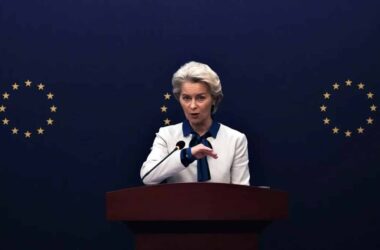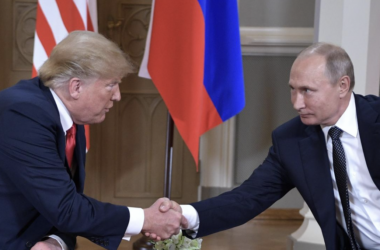At the 2025 Munich Security Conference, U.S. Vice President JD Vance delivered a landmark speech that sent shockwaves through the European political establishment. His address was nothing short of a bold, uncompromising challenge to the Brussels elite, sharply criticizing their handling of free speech, political pluralism, and defense policy. More than just a speech, it was a manifesto of the new Trumpist foreign policy, signaling a clear break from the past and a call for a new USA-EU relationship based on democratic authenticity, and an end to the ideological dominance of the left-liberal establishment.
The Core Messages of Vance’s Speech
Vance’s address in Munich laid out a clear set of challenges to the European Union’s governing elite. Unlike previous American leaders who treated the EU as an unquestionable good, Vance confronted the EU’s failures directly, treating them not as mere policy missteps but as a symptom of a deeper ideological crisis.
A Call for Free Speech and Political Pluralism
One of Vance’s most pointed criticisms was against what he described as the EU’s increasing suppression of free speech and political dissent. He highlighted how conservative and souvereignist’s voices across Europe are routinely silenced through a combination of legal action, media marginalization, and outright censorship. Citing the conviction of a British military veteran for silently praying outside an abortion clinic, Vance pointed out that Europe’s commitment to so-called liberal democracy has transformed into an authoritarian mechanism for suppressing conservative thought.
He did not hesitate to address the deliberate exclusion of right-wing political parties from governance structures, particularly in Germany, where the Alternative for Germany (AfD) has been politically cordoned off despite growing popular support. “You cannot claim to uphold democracy while refusing to engage with legitimate political movements that millions of your citizens support,” Vance remarked, calling for an end to the EU’s systematic efforts to stifle nationalist parties.
The Internal Threat to Europe’s Stability
Vance took aim at the prevailing narrative within EU institutions, which portrays external threats—such as Russia and China—as the primary challenges facing the continent. Instead, he argued that the EU’s greatest existential danger is self-inflicted, driven by reckless immigration policies, economic stagnation due to overregulation, and the refusal to engage with the concerns of ordinary Europeans.
“The greatest crisis in Europe is not coming from Moscow or Beijing—it is coming from within,” he stated. “When you criminalize speech, when you refuse to listen to your voters, when you prioritize ideological purity over real democracy, you create the conditions for your own downfall.”
By framing the EU’s ideological rigidity as its Achilles’ heel, Vance repositioned the debate over Europe’s future. He presented a choice: either Brussels reforms and reconnects with its citizens, or the rising tide of conservative peoples’ will will ultimately dismantle the current European order.
A Demand for European Defense Self-Reliance
Unlike previous USA administrations that reassured Europe of the U.S. security umbrella, Vance delivered a hard truth: America’s focus is shifting, and Europe must take responsibility for its own defense.
He criticized European leaders for their dependency on NATO while failing to invest in their own military capabilities. The Biden-era security guarantees, he suggested, had fostered complacency, allowing European nations to neglect their defense industries and rely too heavily on Washington’s commitments.
“American power is not infinite,” he warned. “We cannot and will not subsidize a Europe that refuses to defend itself.”
This marked a fundamental departure from the past, aligning with Trump’s longstanding belief that European nations must step up and take responsibility rather than expecting indefinite U.S. military protection.
Panic and Backlash in Brussels
Vance’s speech was met with immediate outrage from Europe’s ruling class. Brussels was not just surprised—it was panicked. For decades, the EU had been accustomed to American leaders who, regardless of party affiliation, played along with the rules of the European integration project. Vance, by contrast, threw out the script entirely.
The German Establishment’s Alarm
German Chancellor Olaf Scholz was among the first to respond, condemning Vance’s remarks as “an unacceptable attempt to interfere in European democratic processes.” The real reason for Scholz’s anger, however, was clear: Vance had directly questioned Germany’s political exclusion of the AfD and the broader suppression of nationalist voices across the continent.
For a country that prides itself on a tightly controlled political landscape, where certain views are deemed beyond the pale, Vance’s comments were seen as dangerously disruptive. His call for true political pluralism struck at the heart of the German establishment’s carefully maintained authoritarian order.
The EU Commission’s Frustration
EU Foreign Policy Chief Kaja Kallas accused Vance of “sowing discord” between the United States and its European allies, a claim echoed by European Commission President Ursula von der Leyen, who suggested that the Trump administration was actively undermining the “values-based partnership” between the U.S. and the EU.
In reality, their frustration stemmed from the fact that Vance had openly challenged the EU’s legitimacy as the unchallenged center of European governance. His message resonated not only with conservative leaders in Hungary and Slovakia, but also with growing national movements in France, Italy, Romania…and all around Europe, who saw in his speech a validation of their struggle against EU overreach.
Vance’s Speech as a Programmatic Declaration of Trumpism
Vance’s speech was more than just a critique of Europe’s left-liberal elite; it was a programmatic declaration of Trumpism on the world stage. If Trump’s first presidency was about dismantling the old globalist order, his second term is now actively shaping the post-globalist alternative.
The Trump-Vance vision for new “transatlantic relations” is clear:
The EU must abandon its ideological hegemony and return to real democracy where conservative voices are not criminalized. Europe must recognize that its greatest threats are internal, driven by left-wing social engineering, uncontrolled immigration, and economic mismanagement.European nations must take full responsibility for their own defense, moving away from reliance on American military might.
This vision marks the end of the old order that has dominated Western politics since the Cold War. No longer will the United States serve as a guarantor of European ideological projects. Instead, Washington under Trump and Vance will engage only with those leaders and nations who embrace true sovereignty, democratic pluralism, and political realism.
A Turning Point for Europe
JD Vance’s Munich speech will be remembered as a watershed moment in U.S.-European relations. It was a direct confrontation with the Brussels elite, a challenge to the ideological monopoly they have exercised for decades. More importantly, it was a rallying cry for a new conservative internationalism—one that rejects globalist orthodoxy and embraces national sovereignty, democratic integrity, and genuine political diversity.
The left-liberal order in Europe is decomposing, undone by its own contradictions and failures. Vance’s speech served as both a diagnosis of this decay and a declaration that the future belongs not to the bureaucrats in Brussels but to the citizens of Europe who demand a real voice in their own governance. The Trump era is not just continuing—it is reshaping the world.
At the 2025 Munich Security Conference, U.S. Vice President JD Vance delivered a landmark speech that sent shockwaves through the European political establishment. His address was nothing short of a bold, uncompromising challenge to the Brussels elite, sharply criticizing their handling of free speech, political pluralism, and defense policy. More than just a speech, it was a manifesto of the new Trumpist foreign policy, signaling a clear break from the past and a call for a new USA-EU relationship based on democratic authenticity, and an end to the ideological dominance of the left-liberal establishment.
The Core Messages of Vance’s Speech
Vance’s address in Munich laid out a clear set of challenges to the European Union’s governing elite. Unlike previous American leaders who treated the EU as an unquestionable good, Vance confronted the EU’s failures directly, treating them not as mere policy missteps but as a symptom of a deeper ideological crisis.
A Call for Free Speech and Political Pluralism
One of Vance’s most pointed criticisms was against what he described as the EU’s increasing suppression of free speech and political dissent. He highlighted how conservative and souvereignist’s voices across Europe are routinely silenced through a combination of legal action, media marginalization, and outright censorship. Citing the conviction of a British military veteran for silently praying outside an abortion clinic, Vance pointed out that Europe’s commitment to so-called liberal democracy has transformed into an authoritarian mechanism for suppressing conservative thought.
He did not hesitate to address the deliberate exclusion of right-wing political parties from governance structures, particularly in Germany, where the Alternative for Germany (AfD) has been politically cordoned off despite growing popular support. “You cannot claim to uphold democracy while refusing to engage with legitimate political movements that millions of your citizens support,” Vance remarked, calling for an end to the EU’s systematic efforts to stifle nationalist parties.
The Internal Threat to Europe’s Stability
Vance took aim at the prevailing narrative within EU institutions, which portrays external threats—such as Russia and China—as the primary challenges facing the continent. Instead, he argued that the EU’s greatest existential danger is self-inflicted, driven by reckless immigration policies, economic stagnation due to overregulation, and the refusal to engage with the concerns of ordinary Europeans.
“The greatest crisis in Europe is not coming from Moscow or Beijing—it is coming from within,” he stated. “When you criminalize speech, when you refuse to listen to your voters, when you prioritize ideological purity over real democracy, you create the conditions for your own downfall.”
By framing the EU’s ideological rigidity as its Achilles’ heel, Vance repositioned the debate over Europe’s future. He presented a choice: either Brussels reforms and reconnects with its citizens, or the rising tide of conservative peoples’ will will ultimately dismantle the current European order.
A Demand for European Defense Self-Reliance
Unlike previous USA administrations that reassured Europe of the U.S. security umbrella, Vance delivered a hard truth: America’s focus is shifting, and Europe must take responsibility for its own defense.
He criticized European leaders for their dependency on NATO while failing to invest in their own military capabilities. The Biden-era security guarantees, he suggested, had fostered complacency, allowing European nations to neglect their defense industries and rely too heavily on Washington’s commitments.
“American power is not infinite,” he warned. “We cannot and will not subsidize a Europe that refuses to defend itself.”
This marked a fundamental departure from the past, aligning with Trump’s longstanding belief that European nations must step up and take responsibility rather than expecting indefinite U.S. military protection.
Panic and Backlash in Brussels
Vance’s speech was met with immediate outrage from Europe’s ruling class. Brussels was not just surprised—it was panicked. For decades, the EU had been accustomed to American leaders who, regardless of party affiliation, played along with the rules of the European integration project. Vance, by contrast, threw out the script entirely.
The German Establishment’s Alarm
German Chancellor Olaf Scholz was among the first to respond, condemning Vance’s remarks as “an unacceptable attempt to interfere in European democratic processes.” The real reason for Scholz’s anger, however, was clear: Vance had directly questioned Germany’s political exclusion of the AfD and the broader suppression of nationalist voices across the continent.
For a country that prides itself on a tightly controlled political landscape, where certain views are deemed beyond the pale, Vance’s comments were seen as dangerously disruptive. His call for true political pluralism struck at the heart of the German establishment’s carefully maintained authoritarian order.
The EU Commission’s Frustration
EU Foreign Policy Chief Kaja Kallas accused Vance of “sowing discord” between the United States and its European allies, a claim echoed by European Commission President Ursula von der Leyen, who suggested that the Trump administration was actively undermining the “values-based partnership” between the U.S. and the EU.
In reality, their frustration stemmed from the fact that Vance had openly challenged the EU’s legitimacy as the unchallenged center of European governance. His message resonated not only with conservative leaders in Hungary and Slovakia, but also with growing national movements in France, Italy, Romania…and all around Europe, who saw in his speech a validation of their struggle against EU overreach.
Vance’s Speech as a Programmatic Declaration of Trumpism
Vance’s speech was more than just a critique of Europe’s left-liberal elite; it was a programmatic declaration of Trumpism on the world stage. If Trump’s first presidency was about dismantling the old globalist order, his second term is now actively shaping the post-globalist alternative.
The Trump-Vance vision for new “transatlantic relations” is clear:
The EU must abandon its ideological hegemony and return to real democracy where conservative voices are not criminalized. Europe must recognize that its greatest threats are internal, driven by left-wing social engineering, uncontrolled immigration, and economic mismanagement.European nations must take full responsibility for their own defense, moving away from reliance on American military might.
This vision marks the end of the old order that has dominated Western politics since the Cold War. No longer will the United States serve as a guarantor of European ideological projects. Instead, Washington under Trump and Vance will engage only with those leaders and nations who embrace true sovereignty, democratic pluralism, and political realism.
A Turning Point for Europe
JD Vance’s Munich speech will be remembered as a watershed moment in U.S.-European relations. It was a direct confrontation with the Brussels elite, a challenge to the ideological monopoly they have exercised for decades. More importantly, it was a rallying cry for a new conservative internationalism—one that rejects globalist orthodoxy and embraces national sovereignty, democratic integrity, and genuine political diversity.
The left-liberal order in Europe is decomposing, undone by its own contradictions and failures. Vance’s speech served as both a diagnosis of this decay and a declaration that the future belongs not to the bureaucrats in Brussels but to the citizens of Europe who demand a real voice in their own governance. The Trump era is not just continuing—it is reshaping the world.




